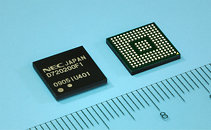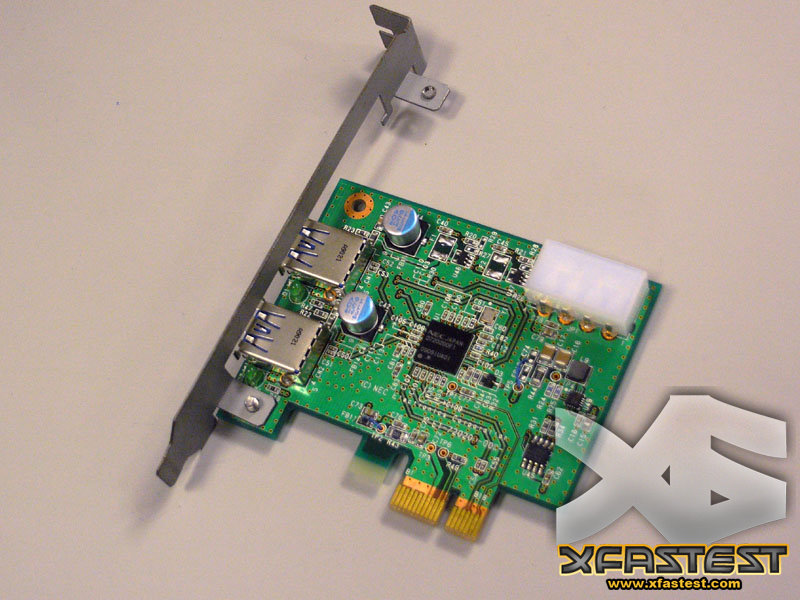malware
New Member
- Joined
- Nov 7, 2004
- Messages
- 5,422 (0.72/day)
- Location
- Bulgaria
| Processor | Intel Core 2 Quad Q6600 G0 VID: 1.2125 |
|---|---|
| Motherboard | GIGABYTE GA-P35-DS3P rev.2.0 |
| Cooling | Thermalright Ultra-120 eXtreme + Noctua NF-S12 Fan |
| Memory | 4x1 GB PQI DDR2 PC2-6400 |
| Video Card(s) | Colorful iGame Radeon HD 4890 1 GB GDDR5 |
| Storage | 2x 500 GB Seagate Barracuda 7200.11 32 MB RAID0 |
| Display(s) | BenQ G2400W 24-inch WideScreen LCD |
| Case | Cooler Master COSMOS RC-1000 (sold), Cooler Master HAF-932 (delivered) |
| Audio Device(s) | Creative X-Fi XtremeMusic + Logitech Z-5500 Digital THX |
| Power Supply | Chieftec CFT-1000G-DF 1kW |
| Software | Laptop: Lenovo 3000 N200 C2DT2310/3GB/120GB/GF7300/15.4"/Razer |
NEC Electronics today introduced the world's first Universal Serial Bus (USB) host controller (part number µPD720200) for the new SuperSpeed USB 3.0 standard. NEC Electronics expects rapid adoption of the device and standard as the need to transfer larger and larger amounts of information between PCs to external hard-drives, portable electronics devices, and flash-based thumb drives, continues to grow rapidly.
The µPD720200 device is a host controller for PCs and other digital devices, and is based on the new version of the SuperSpeed USB standard. Supporting the world's fastest USB transfer speeds of up to 5 gigabits per second (Gbps) of data, which is 10 times faster than previous USB 2.0 transfer speeds. The NEC Electronics device, as well as the standard, is fully backward compatible with the USB 2.0, 1.1 and 1.0 versions of the USB standard.

With its high-speed transfer capability, the µPD720200 host controller makes it possible to expand the boundaries of digital appliances such as PCs, digital TVs, and DVD recorders. The new SuperSpeed USB 3.0 chip from NEC Electronics requires only 70 seconds to transfer 25 Gb of video content on a blu-ray disc, compared to 14 minutes to transfer the same content when using the high-speed USB 2.0 with 480 Mbps transfer capability. This enormous increase in transfer speed will enable system designers to transfer large-volume data quickly and without stress and develop a new generation of high-performance consumer electronic products.
USB is the next-generation interface standard used in a wide range of electronic devices including PCs and PC peripherals. Originally designed as an interface for relatively low-speed computer peripherals, USB made it possible to connect keyboards, mice, and other devices with the same USB standard cables. Later, version 2.0 of the standard defined a high-speed transfer mode that made USB a practical and popular interface for devices such as digital televisions, digital cameras, and DVD recorders. USB version 3.0 builds on this success by offering a ten-fold increase in speed, for stress-free transfers of large volumes of data.
The high data transfer rate also offers compatibility with recent high-performance computer interfaces such as PCI Express and SATA (Serial Advanced Technology Attachment), which are capable of data transfer at speeds in excess of 3 Gbps.
As a member of the USB Implementers Forum since 1996, NEC Electronics has played a leading role both in defining the USB standards and in developing USB technology. In 2000, the company launched the µPD720100, the world's first USB 2.0-compliant host controller chip. It has also developed hub controllers and an extensive lineup of other USB devices, all of which are certified to display the USB logo. As a result, the company has won the trust of the marketplace and shipped 161 million USB devices as of March 2009.
NEC Electronics expects the market for USB 3.0 products to begin a rapid expansion in 2010. It intends to market the new µPD720200 USB 3.0 controller aggressively, and to offer a range of related products by incorporating USB 3.0 communications as an IP (intellectual property) core function in various application specific ICs.
Please refer to the separate sheet for the main specifications of µPD720200.
Pricing and Availability
Samples of NEC Electronics' µPD720200 host controller are expected to be available in June 2009 at US$15 each, along with free Windows device driver software. Monthly production is expected to reach approximately 1,000,000 units in September 2009. Pricing and availability are subject to change without notice. More information can be found at http://www.necel.com/usb/en/index.html.
View at TechPowerUp Main Site
The µPD720200 device is a host controller for PCs and other digital devices, and is based on the new version of the SuperSpeed USB standard. Supporting the world's fastest USB transfer speeds of up to 5 gigabits per second (Gbps) of data, which is 10 times faster than previous USB 2.0 transfer speeds. The NEC Electronics device, as well as the standard, is fully backward compatible with the USB 2.0, 1.1 and 1.0 versions of the USB standard.

With its high-speed transfer capability, the µPD720200 host controller makes it possible to expand the boundaries of digital appliances such as PCs, digital TVs, and DVD recorders. The new SuperSpeed USB 3.0 chip from NEC Electronics requires only 70 seconds to transfer 25 Gb of video content on a blu-ray disc, compared to 14 minutes to transfer the same content when using the high-speed USB 2.0 with 480 Mbps transfer capability. This enormous increase in transfer speed will enable system designers to transfer large-volume data quickly and without stress and develop a new generation of high-performance consumer electronic products.
USB is the next-generation interface standard used in a wide range of electronic devices including PCs and PC peripherals. Originally designed as an interface for relatively low-speed computer peripherals, USB made it possible to connect keyboards, mice, and other devices with the same USB standard cables. Later, version 2.0 of the standard defined a high-speed transfer mode that made USB a practical and popular interface for devices such as digital televisions, digital cameras, and DVD recorders. USB version 3.0 builds on this success by offering a ten-fold increase in speed, for stress-free transfers of large volumes of data.
The high data transfer rate also offers compatibility with recent high-performance computer interfaces such as PCI Express and SATA (Serial Advanced Technology Attachment), which are capable of data transfer at speeds in excess of 3 Gbps.
As a member of the USB Implementers Forum since 1996, NEC Electronics has played a leading role both in defining the USB standards and in developing USB technology. In 2000, the company launched the µPD720100, the world's first USB 2.0-compliant host controller chip. It has also developed hub controllers and an extensive lineup of other USB devices, all of which are certified to display the USB logo. As a result, the company has won the trust of the marketplace and shipped 161 million USB devices as of March 2009.
NEC Electronics expects the market for USB 3.0 products to begin a rapid expansion in 2010. It intends to market the new µPD720200 USB 3.0 controller aggressively, and to offer a range of related products by incorporating USB 3.0 communications as an IP (intellectual property) core function in various application specific ICs.
Please refer to the separate sheet for the main specifications of µPD720200.
Pricing and Availability
Samples of NEC Electronics' µPD720200 host controller are expected to be available in June 2009 at US$15 each, along with free Windows device driver software. Monthly production is expected to reach approximately 1,000,000 units in September 2009. Pricing and availability are subject to change without notice. More information can be found at http://www.necel.com/usb/en/index.html.
View at TechPowerUp Main Site













